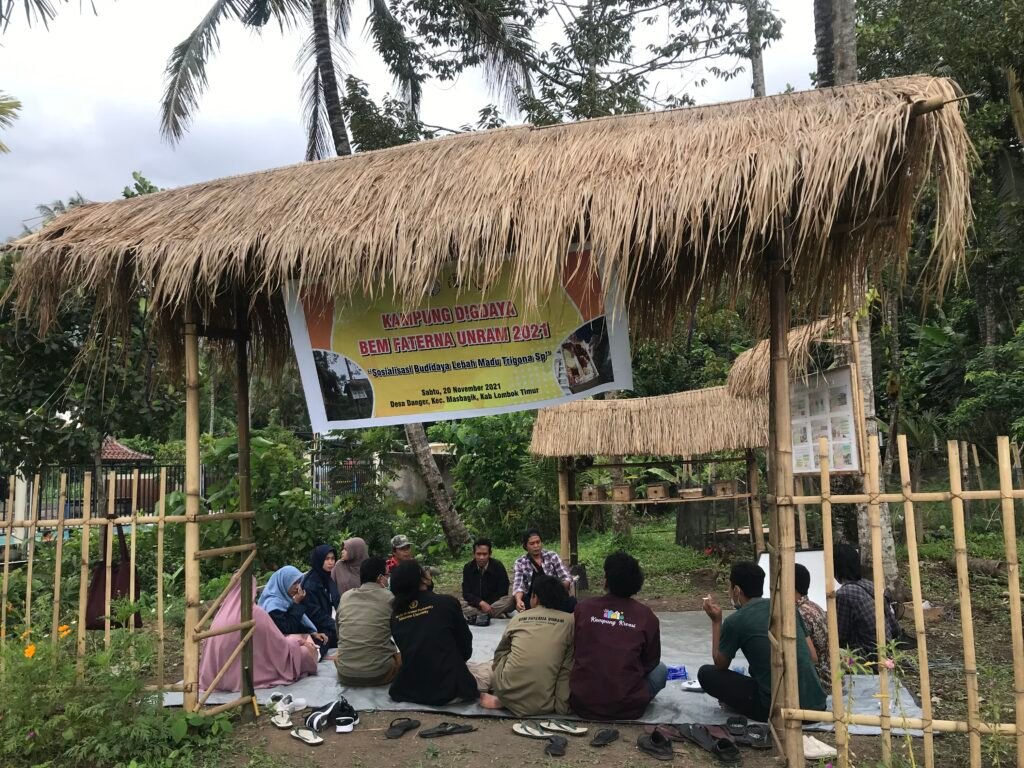Trigona Bee Cultivation Training: An Innovative Solution for Income Generation and Nutritional Resilience in Bayan Village
The training on trigona bee cultivation is designed to equip the pilot group in Bayan Village with comprehensive knowledge and practical skills to successfully manage their beekeeping activities. This initiative addresses both economic and nutritional concerns, offering a sustainable solution for additional income generation while improving the nutritional intake of families. Trigona bees are known for producing high-value products such as honey, bee pollen, and propolis, which contain essential nutrients, antioxidants, and medicinal properties beneficial to overall health. By integrating beekeeping into daily agricultural practices, local communities can enhance food security and contribute to the reduction of malnutrition-related issues such as stunting.
The training covers key aspects of trigona bee cultivation, starting with an introduction to the biology and behavior of these stingless bees. Participants learn how to select appropriate locations for hive placement, establish and maintain colonies, and optimize environmental conditions to ensure healthy bee populations. Additionally, the program teaches effective hive management techniques, including monitoring colony health, preventing diseases, and improving honey production methods. These foundational skills enable beekeepers to maximize their yields while maintaining sustainable practices that protect the surrounding ecosystem.
A significant portion of the training focuses on harvesting and processing trigona bee products to maintain quality and increase market value. Proper extraction methods for honey, bee pollen, and propolis are demonstrated, ensuring that products meet hygiene and safety standards. Participants are also introduced to packaging and branding strategies, allowing them to position their products competitively in local and broader markets. Marketing insights are shared, helping them develop sales channels, establish partnerships, and explore e-commerce opportunities to expand their customer base. By strengthening economic prospects through beekeeping, families gain financial stability while promoting the wider adoption of trigona bee farming.
Another critical component of the training is the direct contribution of trigona bee products to community health. The nutritional benefits of honey and bee pollen are highlighted, emphasizing their role in addressing deficiencies in essential micronutrients. Propolis, known for its antimicrobial and medicinal properties, is explored as a natural supplement that can enhance immunity and prevent infections. The program also discusses how these products can be incorporated into daily diets to support overall well-being, particularly among children and pregnant women who are more vulnerable to nutritional deficiencies.
To ensure the long-term success of the initiative, the training incorporates strategies for scaling up beekeeping efforts, forming cooperatives, and accessing funding support. The pilot group is encouraged to serve as a model for neighboring communities, demonstrating how trigona bee cultivation can provide sustainable solutions to economic and nutritional challenges. By sharing knowledge and experiences, the program fosters a collaborative environment where local farmers can continuously improve and innovate within the beekeeping sector. Through dedication and collective effort, trigona bee cultivation can be an impactful driver of agricultural sustainability and community development in Bayan Village and beyond.
Let me know if you would like any refinements or additional details to make the training description even more aligned with your vision!

